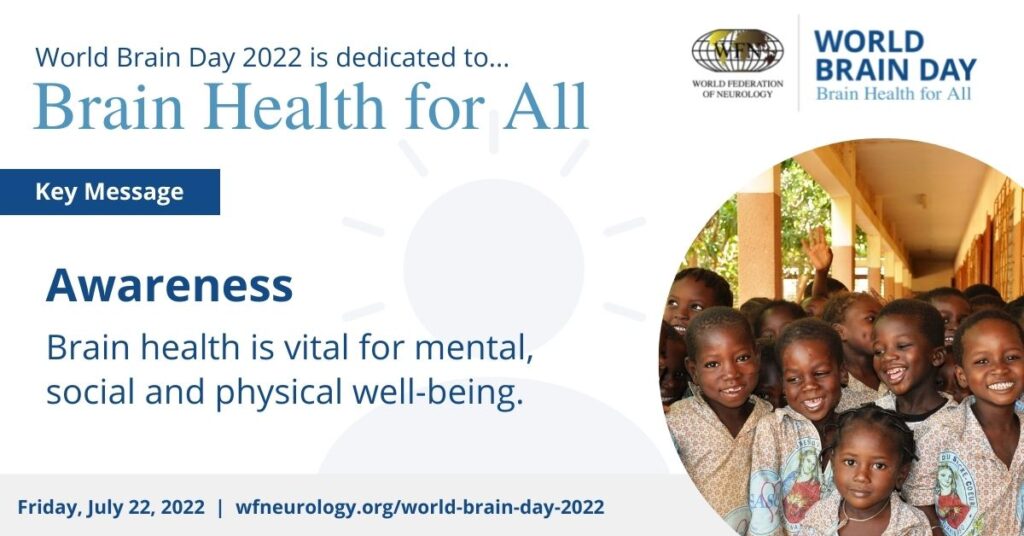
July 22 is World Brain Day and in 2022 is dedicated to the concept of “Brain Health for All” as we continue to be challenged by pandemics, war and political divides, climate change, and more. The goal for 2022 is to increase awareness, prevention, advocacy, education, and access to treatment, which will lead to a healthier future for everyone.
A few neurological disorders that reflect brain health include:
Migraine and other headaches
Headaches are a very common source of pain. It is estimated that 75% of adults worldwide have experienced a headache in the past 12 months. Headaches can be caused by a myriad of conditions, such as sinus congestion, trauma or head injury, high blood pressure, illness—just to name a few. Headaches can be mild and easily treated. On the opposite end of the spectrum, headaches can be severe, causing extreme pain, accompanied by nausea, sensitivity to light, and other conditions that can cause the person experiencing the headache to be incapacitated.
Alzheimer’s disease and other dementias
“Dementia” is an umbrella term that refers to several specific medical conditions, including Alzheimer’s Disease. Dementia is caused by abnormal brain changes, that can cause a decline in thinking skills. This decline can become severe enough to reduce our ability to function in daily life.
Stroke
Stroke is the number 5 cause of death and a leading cause of disability in the U.S. A stroke happens when blood flow to the brain is blocked, stopping the flow of oxygen and nutrients into the brain. Brain cells begin to die within minutes of this blockage. The severity and impact of a stroke depends on the time that passes prior to treatment—every minute truly counts—and the location of the blood flow blockage.
Parkinson’s Disease
Parkinson’s disease is a brain disorder that causes unintended or uncontrollable movements, such as shaking, stiffness, and difficulty with balance and coordination. Symptoms usually begin gradually and worsen over time. Symptoms of Parkinson’s disease occur when nerve cells in the brain that control movement become impaired and/or die. Research is ongoing to determine the cause of Parkinson’s, and many researchers now believe that it results from a combination of genetic and environmental factors, such as exposure to toxins.
Multiple Sclerosis
Multiple sclerosis is a disease that affects your brain and spinal cord. It damages the material that surrounds and protects nerve cells, slowing down or blocking messages between your brain and your body. Symptoms include muscle weakness, difficulty with coordination and balance, sensations such as numbness or “pins and needles,” visual difficulties, and thinking or memory problems. More severe cases may result in paralysis, vision loss, and mobility difficulties.
Epilepsy
Epilepsy is the fourth most common neurological disorder in the world and causes seizures. Seizures are sudden surges of abnormal electrical activity in your brain and can affect how you appear or act. There are many misconceptions about what should be done if a person is experiencing a seizure. The Epilepsy Foundation reports that the correct seizure first aid is simple: Stay. Safe. Side. Stay with the person and start timing the seizure. Keep the person safe. Turn the person onto their side if they are not awake and aware. Do not put anything in their mouth. Do not restrain. Stay with them until they are awake and alert after the seizure. Call 911 if the seizure lasts longer than 5 minutes, if there are multiple seizures, if the person has difficulty breathing, if the seizure occurs in water, if the person is injured, pregnant or sick, if the person does not return to their usual state, if this is a first-time seizure, or if the person asks for medical help.
Brain disorders disproportionately impact older people and are a leading cause of disability. While the usual suggestions of an active lifestyle, healthy food choices, etc. are important to maintaining both physical and mental health, if a person believes they or a loved one is experiencing a brain health challenge, a trip to your medical professional is recommended.
